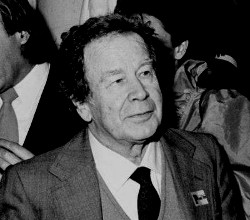




|
Fernando
Claudín (1915-1990)  Spanish communist born in
Zaragoza, in the Aragon region of north Spain, into a
petty-bourgeois republican family. Around 1930 his family
moved to Madrid and shortly after he began studying
architecture. In the early 1930s he joined the Communist
Youth, eventually becoming an important leader in it, and in
1936 took part in it's unification with the Socialist Youth
to form the United Socialist Youth.
In the first few months of
the Civil War, he fought on the Guadarrama front, later
becoming involved in propaganda and organizing work, as well
as being an important assistant to the junta for the defense
of Madrid. In 1937 he was elected to the Spanish Communist
Party's Central Committee. Spent the final year of the war
reorganizing the defense in the republican center-south
region. The same day that Madrid fell, he was able to escape
to Oran, Algeria, where he was temporarily put in a
concentration camp before making his way to the Soviet
Union. From there he was sent to Paris to direct the press
of the United Socialist Youth. Fleeing the Nazi occupiers
after the beginning of WWII he spent the war in exile
between Mexico, Cuba, Chile and Argentina.
After the war he returned to
France where he helped organizing documents, arms, and
propaganda to be sent into Spain, and in 1946 was selected
to join the party's Politburo. In 1947 he was sent to Moscow
to represent the party and experienced first-hand the
postwar period of intense Stalinist paranoia and repression.
In 1955 he was sent to Paris again to direct the party's
ideological and educational work. After working hard to
organize the "National Strike" of 1959, including an
underground presence in Madrid, and seeing it's spectacular
failure, Claudín began to question the tactics imposed on
them by the Soviet Union and the party's tendency to disdain
instead of encourage open debate of ideas and plans.
Claudín and others continued
to critique the party's past behavior and advocate for
drastic changes, including greater internal democracy in the
party and independence from Soviet diktats and petty
interference. This led to Claudín being expelled from the
party in 1964, after which Claudín began dedicating himself
to translation and writing. He returned to Madrid in 1975,
the year Franco died. As Spain slowly returned to liberal
democracy, Claudín became an advocate of "Eurocommunism" or
radical social democracy. Claudín remained active on the
left in Spain and a committed progressive until his death.
The Communist Movement
(1970)
Important two-part book that
deals with the Comintern and Cominform from a leftist
anti-Stalinist perspective. Especially important due to the
lack of writing from this perspective on the functioning and
experience of the Comintern, much less the Cominform.
Part
One: The Crisis of the Communist International: 389
pages. A detailed analysis of the Comintern from it's
beginning to its dissolution, a sacrifice on the altar of
Stalin's alliance with the western powers. Deals with the
concrete problems that stunted it's growth: i.e. lack of
revolutions in Europe between the world wars and it's
theoretical shortcomings. Also discussed in length is the
"ultra-centralism" of the decision making inside the
Comintern: i.e. it carrying out blindly whatever the Soviet
party decided with little to no influence of any other party.
Also deals extensively with the massive failures of the
Comintern, some well known such as the collapse of the German
Communist Party, the continual damage caused to the Chinese
Revolution, the various anti-fascist fronts in Spain and
France among other places, and others not such as the shameful
arming of Ataturk (by Lenin) as he massacred communists and
Armenians and in general it's poor performance in colonized
countries.
Part
Two: The Zenith of Stalinism: 436 pages. Details the
important late-WWII and post-war period with special focus on
the communist resistance movements in Europe, the Cominform,
and the final, post-war period of Stalinist repression.
Claudín deals with the Soviet-centered policies forced on the
two biggest European communist parties in France and Italy,
which forced them to forgo any revolution in their countries,
even though they were armed, popular, the largest parties in
their country, and facing an extremely weakened bourgeoisie.
Claudín then goes on to discuss the communist parties which
refused these Soviet-centered policies and launched
revolutions in Greece, Yugoslavia, and China and how these
parties were systematically betrayed by the Soviet Union. An
important analysis of the Cominform period about which little
has been written, especially from an independent Marxist
perspective.
|